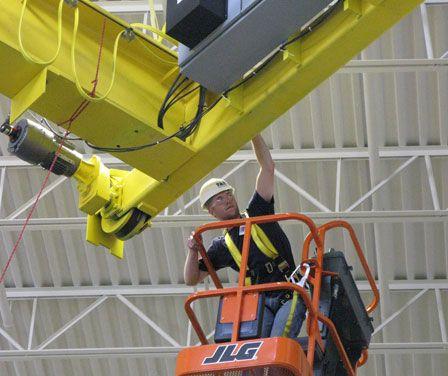
The Importance of Overhead Crane Inspections and Maintenance
12/24/2020You do it because the regulators want you to. You do it because your customers want to see you’ve done it. You do it because it’s a best practice. You do it because you have to. You do it because it’s common sense. Wait – any time something seems like it’s common sense, it’s worth thinking more about. So, why is it important to perform inspections and maintenance on overhead cranes?
Lack of Inspection and Maintenance Result in Property Damage
OSHA standards for crane inspections have been developed to evaluate equipment for warning symptoms of oncoming failure. These signs that something is coming are pretty common and easy to pick up if the inspections are done on the right schedule. Knowing the right schedule (duty cycle) for a given piece of equipment, and getting the inspection done on that duty cycle, is the best way to pick up the clues that something big could go wrong in the near future.
Those who elect not to perform their regular inspections and maintenance usually avoid them for reasons of dollars and cents. Inspections cost money, and they cause down time. But the property damage that can be caused by a failed piece of equipment with a skipped duty cycle is exponentially higher than the cost of a periodic inspection.
Major Injuries and Fatalities Occur When Overhead Cranes are Not Inspected and Maintained
Of course, there are outcomes even more costly than the property damage that can occur when uninspected equipment fails – when operators or employees are injured or killed because equipment was not inspected or maintained on an appropriate duty cycle. These results can be company-ending, and insurance companies tend to be less than accommodating when responsible equipment upkeep hasn’t been handled.
Who wants to be the person responsible when someone gets hurt because of a skipped inspection? And who wants to work for a company that values its employees so lightly? Nobody. The importance of inspections and maintenance of your overhead cranes cannot be understated.
Qualified Professionals Must Perform Inspection and Maintenance
The results of underqualified professionals undertaking inspections and maintenance are so potentially extreme that the Crane Manufacturers Association of America (CMAA) require a crane inspector to have at least 2,000 hours of direct field experience related to maintenance, service, repair, modification, or functional testing of crane/hoist equipment. Formal training requirements are also outlined and include details of federal, state, and local codes and standards. Well-qualified, expert professionals such as those you will work with at Brennan Jacobs will also have years of experience, manufacturer’s training, and the ability to communicate.

